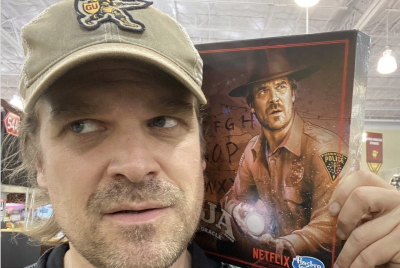Robert Plant's 'Saving Grace' Tour Proves He Doesn't Need Led Zeppelin Anymore
Plant's artistry thrives on evolution, not nostalgia

Robert Plant has once again proven his staying power. The former Led Zeppelin frontman is drawing packed crowds across the United States with his Saving Grace tour, delivering performances that critics call some of his most inspired in years.
The tour, which launched at the Capitol Theatre in Wheeling, West Virginia, on 30 October 2025, has sparked praise for blending fresh material with subtle nods to his legendary past.
Plant's latest success shows that half a century after Led Zeppelin IV, the 77-year-old still commands the stage with the same power and charisma that defined rock's golden era.
The Comeback That Almost Never Happened
In an interview last month, Plant revealed he once believed his recording career was over. 'No more records, that's it,' he recalled, describing a time when he felt he had said all he needed to through music. But the release of Saving Grace on 26 September 2025 marked an unexpected revival.
According to Yahoo Entertainment, Plant admitted he had no plans to return to the recording studio before the new project reignited his passion for performing.
The album, recorded between April 2019 and January 2025 across studios in the Cotswolds and Welsh Borders, is his twelfth solo project.
The collection draws on gospel, folk and early blues influences, reinterpreting traditional songs with a restrained but powerful edge.
Its success reignited Plant's passion for performing and laid the foundation for a US tour that's now being hailed as one of his finest post-Zeppelin eras.
The Band That 'Saved His Sanity'
Plant's new band, also named Saving Grace, features vocalist Suzi Dian, guitarist Tony Kelsey, banjo and string player Matt Worley, drummer Oli Jefferson and cellist Barney Morse-Brown.
Together, they produce a sound grounded in acoustic and folk influences rather than the powerful, electric energy of Led Zeppelin.
Speaking about his collaborators, Plant described the group as a creative refuge, saying the ensemble had 'saved my sanity' and that their natural chemistry helped him rediscover his voice.
The result is a more intimate and expressive approach that shows how Plant's artistry continues to evolve beyond nostalgia.
Tour Highlights and Audience Reaction
The Saving Grace tour spans major US cities, including New York, Chicago, Seattle and Los Angeles, running through late November.
At each stop, Plant performs a carefully curated setlist mixing six songs from the new album with reworked versions of Led Zeppelin classics such as Black Dog, Gallows Pole and The Rain Song.
Audiences gave standing ovations throughout the shows, with Ultimate Classic Rock noting that Plant's stripped-back renditions of Led Zeppelin classics like Black Dog and The Rain Song offered a fresh emotional depth that resonated strongly with fans.
Radio station WMGK described the shows as 'a testament to Plant's ability to fill arenas on his own terms,' noting that his connection with fans remains as strong as ever.
Reinventing the Led Zeppelin Spirit
Plant has made it clear he has no interest in repeating the past. Instead, Saving Grace explores the roots of Zeppelin's earliest influences through American folk and blues traditions.
In an earlier interview with Mojo, he remarked that 'most people have missed some of the best Zeppelin stuff,' hinting that the Saving Grace project allows him to revisit those overlooked ideas in a modern light.
Critics from Parade and Rolling Stone have praised the new renditions for their authenticity, describing them as 'soulful and raw' rather than nostalgic reproductions.
Each performance underlines that Plant's enduring appeal lies not in reliving Led Zeppelin's legacy, but in reshaping it for a new generation.
From Legacy to Liberation
Robert Plant's Saving Grace tour reinforces his reputation as one of rock's most resilient and adaptable figures.
The strong attendance and critical acclaim confirm what fans already know: Plant no longer needs Led Zeppelin to fill arenas.
With his latest album and tour, he has found creative liberation in simplicity and proven that the golden god of rock still reigns, on his own terms.
© Copyright IBTimes 2025. All rights reserved.





















